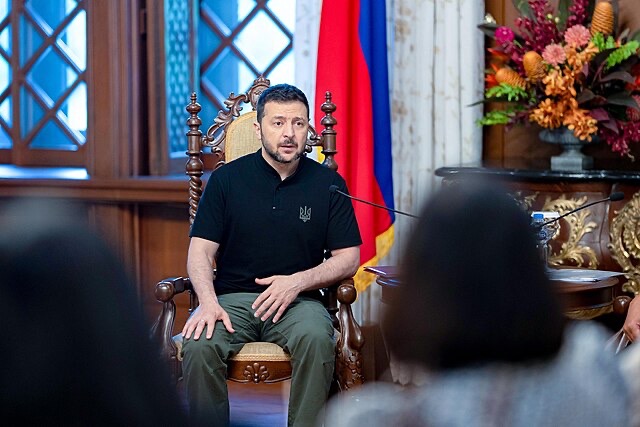Zelensky’s Explosive Remarks Shake the Global Stage
In a striking statement that has reverberated through diplomatic circles and global newsrooms, Ukrainian President Volodymyr Zelensky boldly declared that Russian President Vladimir Putin “will die soon.” This jaw-dropping assertion wasn’t whispered in secret or leaked via back channels—it was made openly during an interview in Paris, where Zelensky was meeting European leaders to rally continued support for Ukraine’s defense and sovereignty.
The comment has fueled existing rumors about Putin’s declining health while simultaneously raising eyebrows about Zelensky’s strategy: is this a sign of confidence, a warning, or a political maneuver? Regardless of motive, Zelensky’s statement has electrified the international discourse surrounding the ongoing Russia-Ukraine war, which has now entered a new, potentially decisive phase.
With a U.S.-brokered partial ceasefire now in play and world powers recalibrating their diplomatic stances, Zelensky’s timing is as deliberate as it is provocative. His message was loud and clear: the era of Vladimir Putin is coming to an end, and the global community must prepare for what follows.
Why These Claims Matter Right Now
Zelensky’s statement doesn’t exist in a vacuum. It comes at a pivotal time when geopolitical tensions remain high, military fatigue is setting in on both sides, and rumors about Putin’s physical condition are gaining traction. Add to that a fresh ceasefire agreement and mounting pressure from Western allies, and it’s clear that the battlefield isn’t just in Ukraine—it’s also in the realm of international perception and psychological warfare.
Statements like “Putin will die soon” are far more than soundbites—they are part of a broader effort to shape the narrative. For Zelensky, it’s about keeping Ukraine in the spotlight, maintaining Western support, and potentially destabilizing Russian confidence from within. For the rest of the world, it raises a haunting question: what happens if Putin really is on his way out?
The Interview: What Zelensky Actually Said
The Quote That Sparked Global Headlines
In his Paris interview, Zelensky didn’t mince words. “Putin will die soon—and that’s a fact,” he stated with conviction. He went on to suggest that this anticipated death would mark the beginning of the end for Russia’s aggressive war against Ukraine.
The statement wasn’t couched in metaphors or vague insinuations. It was direct, unapologetic, and aimed squarely at both the Kremlin and global leaders who may be wavering in their support for Ukraine. While he didn’t provide specific evidence to back his claim, Zelensky’s confidence seemed grounded in intelligence assessments, ongoing military resistance, and his read of internal Russian dynamics.
The Context of His Statement in Paris
Zelensky made the remark while in Paris to meet with French President Emmanuel Macron and other European allies. These meetings are part of Ukraine’s continued effort to shore up long-term military aid, economic support, and diplomatic backing.
His comment appears timed to remind both allies and adversaries of Ukraine’s resolve—and perhaps to rattle nerves in Moscow. While Zelensky is no stranger to strong language, this was one of his most pointed personal attacks on Putin to date, indicating a shift from focusing on the war itself to highlighting Putin’s mortality and the potential collapse of his regime.
Rumors Surrounding Vladimir Putin’s Health
From Cancer to Parkinson’s: A Look at the Claims
Speculation about Vladimir Putin’s health has circulated for years, but over the past 18 months, those rumors have intensified. Unconfirmed reports suggest the Russian leader may be battling a range of health issues, including:
- Parkinson’s disease
- Thyroid or pancreatic cancer
- A recent stroke
- Rapidly declining mental health
Kremlin footage showing Putin visibly trembling, gripping furniture, or appearing bloated has only added fuel to the fire. Kremlin watchers have noted his reduced public appearances and reliance on prerecorded video messages as potential signs of ill health.
However, none of these reports have been independently confirmed. Russia remains tight-lipped, maintaining that Putin is in “excellent health.” Still, the silence and secrecy only serve to deepen suspicion.
The Kremlin’s Repeated Denials
Russian officials have vehemently denied any issues with Putin’s health. Kremlin spokesman Dmitry Peskov has repeatedly dismissed the rumors as “Western propaganda,” claiming they are part of an information war meant to undermine confidence in Russia’s leadership.
But for many observers, the denials ring hollow—especially in a regime known for tightly controlling the flow of information. With Putin’s political and military decisions growing increasingly unpredictable, questions about his physical and mental condition persist. Whether or not they’re based in fact, these rumors now play a central role in how global leaders and strategists prepare for future negotiations and conflict resolution.



